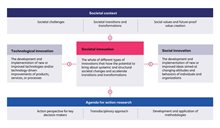Curious? Then read our white paper
This position paper supports our vision of societal innovation, explores its relationship with technological and social innovations, and addresses key challenges.
Societal developments
The examples mentioned in the introduction are just some of the current societal problems that the Netherlands needs to respond to. Others include:
- Climate change and measures to combat it
- Climate adaptation
- The energy transition
- Digitalisation and digital transformation
- Making homes, industry, and transport sustainable
- Labour shortages
- Growing inequality
- Urbanisation
All these current societal problems are complex in themselves. At the same time, there are also strong links between them. A solution to one problem may exacerbate another. Tackling these societal challenges cannot simply be an afterthought. So what now? What do we need to do to ensure that the Netherlands takes concrete steps that bring about overall well-being?
More than technological and social innovation
In our country there is no shortage of initiatives aimed at tackling societal problems. We address these problems through technological developments as well as social initiatives.
Examples of technological innovation include large-scale battery storage and the development of a smart grid. These are solutions to grid congestion (overloading of the electricity grid). There are also initiatives focusing more on behaviour: for example, social innovation designed to ensure that energy demand is better aligned with production.
The above are two different ways of tackling the same societal challenges. However, this does not seem to be enough to bring about the structural systemic changes required. That’s where societal innovation comes in.
Societal innovation
Societal innovation is about innovations that have the potential to achieve the systemic and structural societal changes we are seeking. It guides transitions in the right direction and can accelerate them.
Admittedly, that still sounds pretty abstract. So what do we actually mean by this? Rowie Huijbregts, Public Decision-making and Values Researcher at TNO Vector, explains: ‘When we talk of societal innovation we are thinking of different kinds of innovations, in the fields of politics and governance, institutions, the economy, law, and spatial planning. All these innovations can help change the way governments, businesses, and citizens look at things and the way they think and act. In this way, they can be the trigger for systemic changes. That’s societal innovation.’
Step by step towards systemic changes
According to Claudio Lazo, Digital Transformation Researcher at TNO Vector, the challenge is achieving society-wide change. ‘A single person or organisation cannot usually bring about societal innovation on their own. It actually stems from multiple changes in different parts of society gradually coming together. In the long run, this is how increasingly far-reaching – systemic – changes come about.’
Joining forces and asking the right questions
To address societal problems, you need to join forces and ask the right questions. What is the connection between the various initiatives? What will it take to accelerate them? And where exactly are additional initiatives needed? In short, societal innovation is about finding links between different societal initiatives.
TNO Vector: social and societal innovation
TNO has traditionally been involved in the field of technology. Over the years, it has become clear that a societal view of innovation is indispensable if a new technology is to be well received, and that alongside technological and social innovation you also need a very different focus. TNO Vector, the Centre for Societal Innovation and Strategy, was established to put this into practice. This makes us the obvious party to drive forward societal innovation to support transitions and transformations.

At TNO Vector we focus on societal innovations. Our aim is to solve problems in society by making changes based on the right values. New technologies and social innovations need to fit seamlessly into our society. Through our action research we contribute to practical tools that make this possible.
Wide-ranging and in-depth systems knowledge
The Centre’s 90 employees are all specialists in their own particular fields. These include:
- Energy
- Mobility
- Housing
- IT
- Industry
- Economy
- Management
- Public administration
We therefore have experts available in every conceivable policy area. That gives us the wide-ranging and in-depth systems knowledge needed to support societal innovations.
Amber Geurts, Transformative Innovation Policy Researcher, explains: ‘Working on the basis of our broad expertise, we outline a way forward for key decision-makers, such as citizens, elected representatives, civil servants, ministers, shareholders, and other players in our society. This is necessary to provide an insight into possible actions – such as interventions, investments, new collaborations, participation, or the development and use of certain innovations – that could contribute to the achievement of societal change.’
Creating a trusted environment
According to Huijbregts, the fact that societal innovation has gained in importance brings clearly discernible benefits. ‘Our reasoning is now based much more around the societal problem we want to solve. We then bring together the right group of people and the right resources to come up with solutions. And, in seeking those solutions, we are not necessarily guided by the use of an existing technology or the development of a new technology. No, this is actually just part of a broader approach.’
Huijbregts: ‘I also notice this in the questions we ask ourselves these days. How can we make sure we get the right people around the table and create a trusted environment in which they engage openly with each other? And what is needed to make sure they understand each other? So that’s also a key focus: connecting different parties, with different values and interests.’
Experimenting, learning, and innovating together
TNO Vector’s approach is perfectly aligned with the need to resolve societal problems using new methods. ‘The focus today is much more on directing innovation towards societal transformations,’ Lazo says. ‘We do this by joining existing networks or by bringing different parties together ourselves, for example. The goal is always to experiment, learn, and innovate together.’
‘Our approach works. South Holland’s Smart Industry Hub, for instance, has already delivered some fantastic initiatives to promote innovation within the regional manufacturing industry. The same can be said of the European ecosystem focused on developing Smart Cities. And there are other great examples too. That’s something I am proud of.’
A ‘toolbox’ of four methodologies
Given the complex nature of the societal problems facing the Netherlands, and the need to realise societal innovation, it is important that any steps taken are carefully considered. TNO Vector uses four different methodologies for societal innovation, including:
- System analysis: analysing and understanding the complexity and dynamics of today’s societal problems by taking a broad perspective.
- Foresight studies: exploring shared visions of the future and the shared public values that are important within them.
- Orchestrating innovation: shaping collaborations between public authorities, knowledge institutions, businesses, and civil-society organisations so they are better able to resolve common societal issues. And then driving these collaborations forward.
- Adaptive governance: exploring, developing, and applying new forms of governance and decision-making by public authorities, businesses, knowledge institutions, and civil-society organisations.
We need each other
TNO Vector aims to play a role in guiding societal innovation with a view to accelerating transitions and transformations. The advantage of our organisation is that we are a transdisciplinary player that carries out applied research and has a high level of knowledge.
TNO Vector is part of the system, but acts autonomously and independently within it. That means we are held in high regard by public authorities, businesses, and knowledge institutions. And we can also connect these different parties. That is perhaps the most important thing of all, as to find answers to today’s societal issues, we really need each other.






